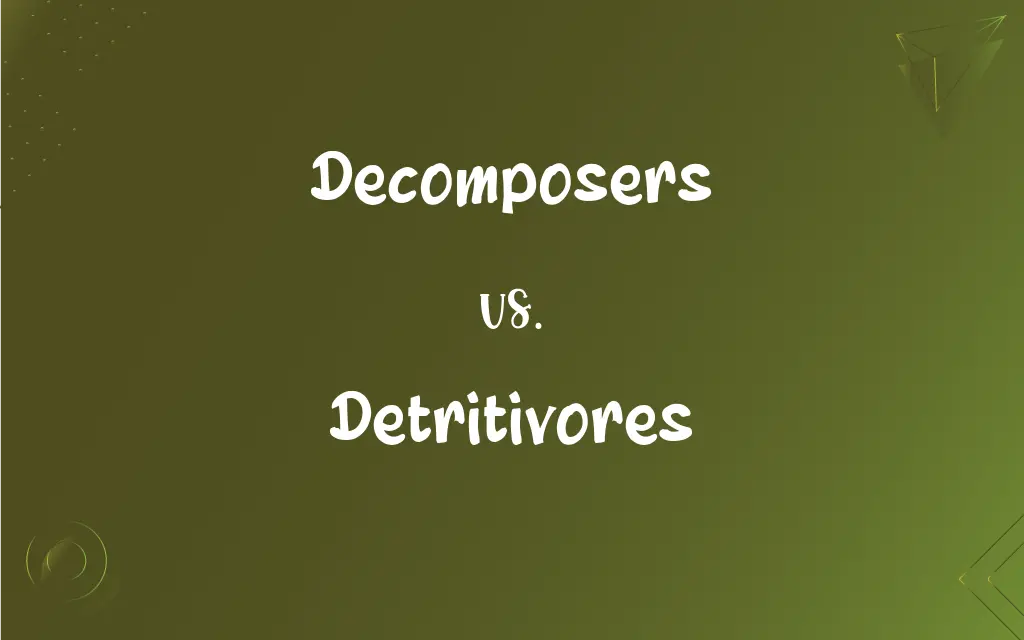Decomposers vs. Detritivores: What's the Difference?
Edited by Janet White || By Harlon Moss || Updated on October 11, 2023
Decomposers break down dead organisms by secreting enzymes, whereas detritivores consume detritus (decomposed matter) to obtain their nutrients.

Key Differences
Decomposers play a pivotal role in ecosystem functioning by breaking down dead organisms and organic waste. The decomposition process involves the decomposers, like fungi and bacteria, secreting enzymes to break down dead matter into simpler substances. Meanwhile, detritivores are organisms that feed directly on dead organisms and waste, physically consuming them to extract nutrients. The distinction lies primarily in their method of nutrient acquisition from dead organic matter.
A prominent characteristic of decomposers is their ability to break down organic material without physically ingesting it. These organisms, which commonly include bacteria and fungi, utilize external digestion, releasing enzymes into the environment to break down dead matter into simpler substances. Detritivores, including earthworms, dung beetles, and millipedes, directly consume detritus (dead organic matter), breaking it down internally. They ingest the material and decompose it internally in a digestive system.
The ecological impacts of decomposers and detritivores, while both significant, manifest in varied ways. Decomposers aid in recycling nutrients directly back into the soil, enhancing its fertility and providing nutrition for plants. Detritivores, through their consumption and excretion of organic matter, help in mechanically breaking it down, creating smaller particles that decomposers can further break down. Both aid in nutrient cycling but do so in distinct stages and manners.
Both decomposers and detritivores are indispensable for nutrient cycling, each serving as a cog in the intricate machine of ecosystem balance. Despite sharing the common role of breaking down dead organic matter, they employ different mechanisms — decomposers chemically break down, while detritivores mechanically break down matter. Understanding the nuanced differences between decomposers and detritivores provides insight into their respective and crucial roles in sustaining ecosystem health.
Comparison Chart
Method of Decomposition
Secrete enzymes to decompose externally.
Ingest dead matter and decompose internally.
ADVERTISEMENT
Examples
Bacteria, Fungi
Earthworms, Dung beetles
Ecological Role
Directly recycle nutrients back into the soil.
Mechanically break down matter, aiding further decomposition by decomposers.
Type of Organisms Decomposed
All dead organic matter.
Primarily consume larger particles of dead organic matter.
Digestion Type
External digestion with enzymes.
Internal digestion within a digestive system.
Decomposers and Detritivores Definitions
Decomposers
They contribute to the organic component of soil, enhancing its fertility and structure.
Decomposers break down leaf litter, enriching the soil and promoting plant growth.
ADVERTISEMENT
Detritivores
They often serve to aid subsequent decomposition by reducing particle size and increasing surface area for decomposers.
Dung beetles, by consuming waste, facilitate further decomposition by smaller organisms.
Decomposers
Decomposers are typically microscopic organisms that play a fundamental role in breaking down organic matter.
Microbial decomposers in the soil ensure the breakdown and recycling of plant and animal waste.
Detritivores
Detritivores are organisms that ingest and digest dead organic matter to extract their nutrients.
Earthworms, as detritivores, consume dead leaves, contributing to the breakdown of organic material.
Decomposers
They facilitate nutrient recycling by converting dead matter into simpler compounds.
Bacteria, significant decomposers, ensure that nutrients in a dead tree are returned to the ecosystem.
Detritivores
Detritivores play a crucial role in mechanical breakdown, physically reducing the size of organic particles.
Woodlice contribute to soil health by mechanically breaking down larger pieces of organic matter.
Decomposers
Decomposers are organisms that break down dead organic material using enzymatic decomposition.
Fungi, as decomposers, play a crucial role in nutrient cycling by breaking down fallen leaves.
Detritivores
Detritivores indirectly assist in nutrient cycling by preparing detritus for further decomposition.
Detritivores like vultures help in maintaining an ecosystem's health by consuming carcasses and preventing the spread of diseases.
Decomposers
Decomposers engage in external digestion, utilizing enzymes to decompose matter outside their bodies.
Decomposers like fungi release enzymes into dead wood, breaking it down into simpler organic matter.
Detritivores
They typically consume larger particles of detritus, including dead animals and fallen leaves.
The millipede, a detritivore, crawls through the forest floor consuming decomposing leaves.
Decomposers
An organism, often a bacterium or fungus, that feeds on and breaks down dead plant or animal matter, thus making organic nutrients available to the ecosystem.
Detritivores
Plural of detritivore
Decomposers
Plural of decomposer
FAQs
Which organisms are typically detritivores?
Organisms like earthworms and millipedes are detritivores.
How do detritivores obtain their nutrients?
Detritivores obtain nutrients by ingesting detritus.
Are all bacteria decomposers?
Not all, but many bacteria function as decomposers.
What is the main difference between decomposers and detritivores?
Decomposers break down matter externally with enzymes, while detritivores ingest it for internal decomposition.
Can an organism be both a decomposer and a detritivore?
Typically organisms are categorized as either decomposers or detritivores based on their decomposition method.
Do detritivores only consume plant matter?
No, detritivores can consume a variety of organic matter, including animal remains.
Are scavengers and detritivores the same?
No, scavengers typically consume larger carrion while detritivores consume finer detritus.
Can detritivores survive without decomposers?
While they can survive, decomposers facilitate further breakdown of their waste, enhancing nutrient cycling.
Are fungi decomposers or detritivores?
Fungi are typically considered decomposers.
Can decomposers break down all types of organic matter?
Decomposers can break down most, but not all types of organic matter.
How do detritivores affect decomposers?
Detritivores create smaller particles from organic matter, which can be further broken down by decomposers.
Is nutrient recycling possible without decomposers?
Decomposers are crucial for nutrient recycling, without them, it would be highly diminished.
Are decomposers visible to the naked eye?
Many decomposers, like bacteria, are microscopic, but some, like fungi, can be seen.
What do decomposers break down?
Decomposers break down dead organisms and organic waste.
Do detritivores perform external digestion like decomposers?
No, detritivores perform internal digestion.
Why are detritivores important in an ecosystem?
They help in mechanically breaking down organic matter, facilitating further decomposition.
What is the role of decomposers in a food web?
Decomposers break down dead matter, recycling nutrients back into the ecosystem.
What type of environments do decomposers inhabit?
Decomposers inhabit a wide range of environments, including soil, water, and air.
Do detritivores contribute to nutrient cycling?
Yes, detritivores play a vital role in nutrient cycling.
Are decomposers important for soil health?
Yes, decomposers are vital for maintaining soil health and fertility.
About Author
Written by
Harlon MossHarlon is a seasoned quality moderator and accomplished content writer for Difference Wiki. An alumnus of the prestigious University of California, he earned his degree in Computer Science. Leveraging his academic background, Harlon brings a meticulous and informed perspective to his work, ensuring content accuracy and excellence.
Edited by
Janet WhiteJanet White has been an esteemed writer and blogger for Difference Wiki. Holding a Master's degree in Science and Medical Journalism from the prestigious Boston University, she has consistently demonstrated her expertise and passion for her field. When she's not immersed in her work, Janet relishes her time exercising, delving into a good book, and cherishing moments with friends and family.































































